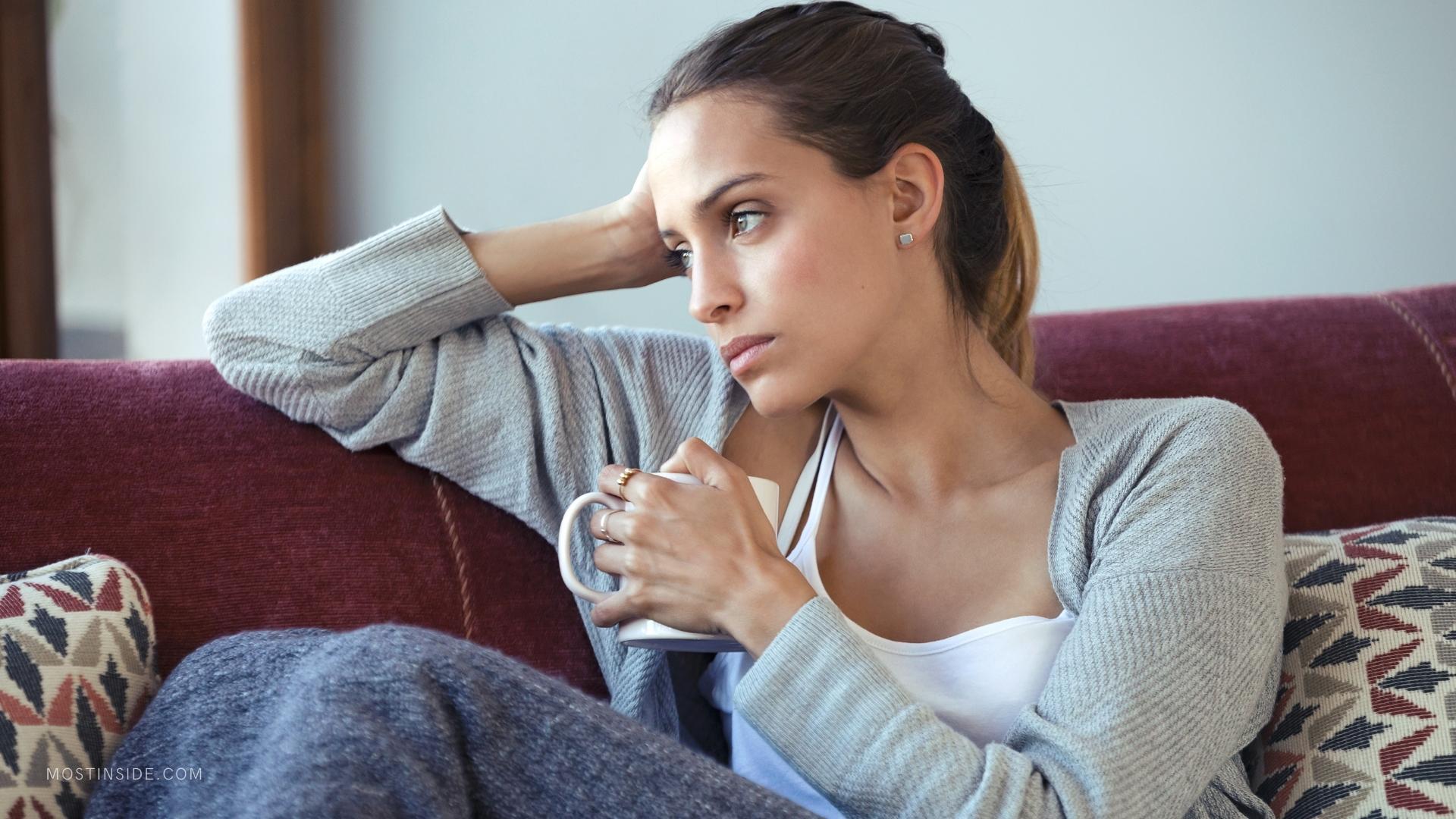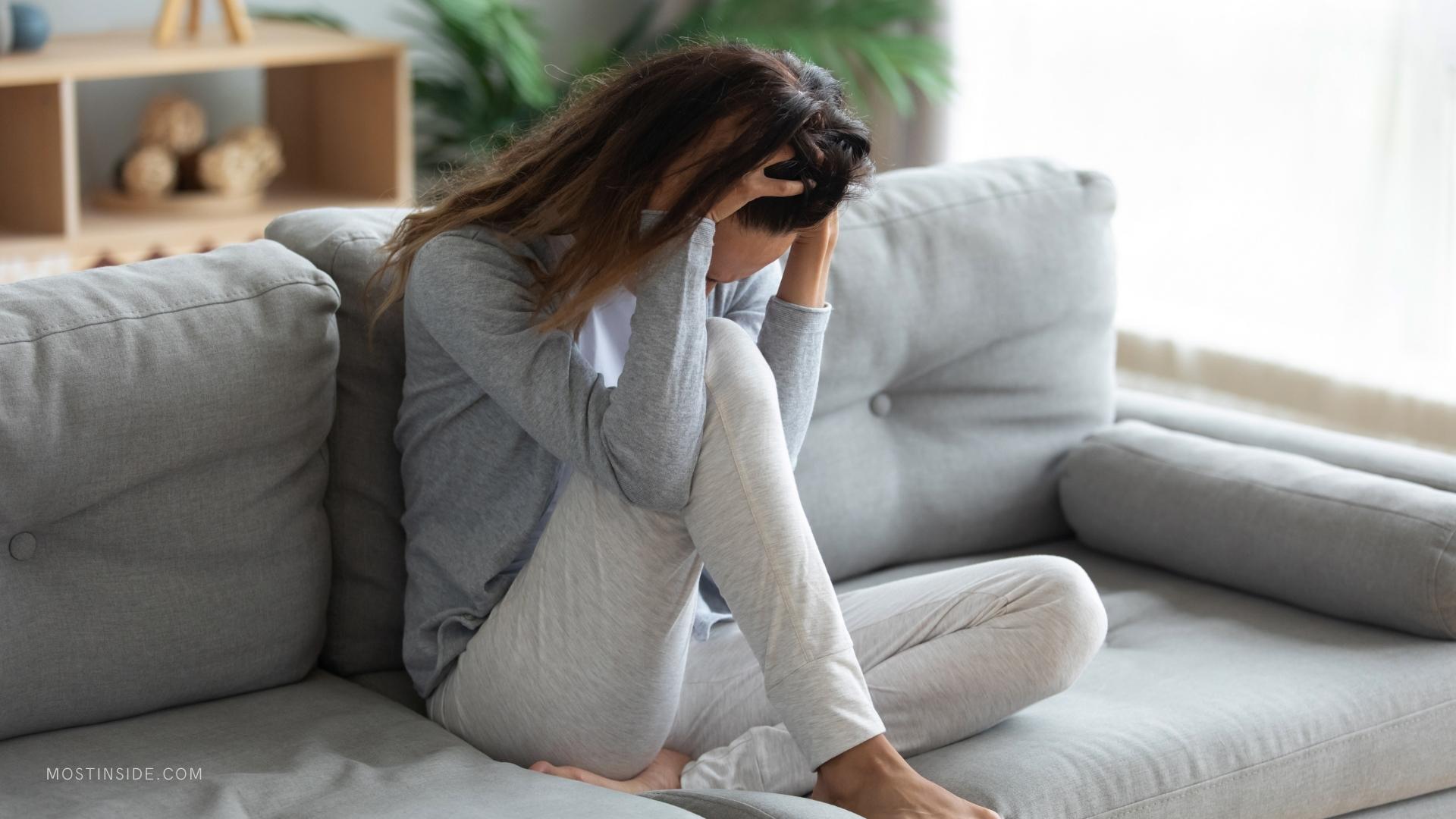10 Simple Steps To Cope With Anxiety
This post was last updated on February 22nd, 2024
Do you often feel your heart racing so fast or your palms sweating heavily every time you’re at work? Or perhaps your mind goes blank, and you suddenly feel restless when you’re about to go somewhere crowded? These feelings could be symptoms of anxiety. Anxiety is a normal and natural human reaction.
You can be anxious when presented with specific challenges and situations that make you nervous such as going on a job interview or showing up on your first date. However, when you regularly feel anxious every day despite no particular reasons at all, that’s when your anxiety can adversely affect your mental health and overall quality of life. So, how should you deal with anxiety?

What Is Anxiety?
Anxiety is your body’s usual way of responding to stressful situations, for starters. These stressful situations can be anything your body considers a threat to your overall well-being, whether physical, psychological, or emotional. Anxiety can present itself in numerous ways.
For example, emotional symptoms of anxiety may include feelings of worry or anger. Physiological anxiety is when you sweat heavily or you experience heavy breathing. Meanwhile, behavioral anxiety symptoms can be sudden changes in your sleeping and eating habits. Either way, these responses are often temporary, and they’ll eventually subside once the threatening or stressful event is over.
But sometimes, dealing with your anxiety can be difficult, especially when you’re not sure why you’re anxious in the first place. This is true, considering that nowadays, the global pandemic has forced everyone to stay indoors, adapt to the new normal, and practice safety precautions to prevent contracting the virus. And so, many people began feeling more anxious every day due to the threat of the pandemic.
Why Are You So Anxious?
There are still plenty of reasons for feeling anxious besides the ongoing pandemic. It can be due to genetics, environmental problems, medical conditions, or traumatic events. Knowing the causes of anxiety may help you better cope with it and find effective ways to relieve yourself.
- Genetics
When most of your family members are constantly anxious or have suffered from an anxiety disorder, there’s a greater chance that you can experience it too. Genetics can play a role in causing your anxiety. Thus, when you know that anxiety is a common problem in your bloodline, it’s recommended that you seek professional treatment and attend anxiety counseling with your therapist. The professionals will help you identify your thoughts and behaviors that lead to anxiety and find ways to manage them. This will also prevent you from passing your anxiety traits or behaviors to your children.
- Environmental Problems
This is probably the most common cause of anxiety. Environmental problems may include:
- Struggling to find your basic needs (e.g., food, water, shelter)
- Financial Problems
- Being rejected by society (e.g., being ignored by your friends or loved ones)
- Being exposed to crowded places
- Working on a low-paying job with tight deadlines
- Being constantly discriminated against due to your race, sexual orientation, or religion
While you can resolve some of these factors through life changes (e.g., quitting your job, avoiding crowded places), most of them are also out of a person’s control. Thus, when you’re exposed to these stressors for a long time, your anxiety may soon become chronic and lead to anxiety disorders.
- Underlying Medical Problems
Others may experience anxiety due to their medical problems or illnesses. Here are some medical issues that could trigger anxiety:
- Heart problems
- Poor nutrition or vitamin deficiency
- Autoimmune disorders
- Neurological conditions
- Infectious diseases
- Hormonal problems
- Food allergies
When you’re experiencing anxiety symptoms due to your medical condition, don’t hesitate to consult your healthcare provider, and they can help you create lifestyle adjustments to minimize your anxiety.
Medications
In connection to your medical problems, doctors would often prescribe you particular medications for your illness. However, some of these medications may cause you anxiety as part of the side effects when you start taking them. Anxiety may also occur when you abruptly stop taking your medications, in which you’ll experience withdrawal symptoms, including anxiety. Thus, when you feel anxiety symptoms when taking or stopping a medication, talk to your doctor immediately.
Traumatic Experiences
People who’ve survived or are going through traumatic events in their life are also more likely to feel anxious and develop anxiety disorders. These events may include violence, war, abuse, sexual assault, or sudden loss or death in the family. Remember that anxiety is your body’s usual way of responding to threatening situations. This means that when you encounter something or someone that reminds you of your trauma, it can trigger your anxiety.
For example, women who have survived abuse or sexual assault in the past may suffer from poor sleep and chronic anxiety, especially when the past events appear in their nightmares. Meanwhile, military veterans exposed to loss, death, war, and other extreme situations are more likely to develop anxiety.

10 Simple Steps To Cope With Anxiety
Knowing how to deal with your anxiety will help you maintain your mental and emotional health. For your guide, here are ten simple steps to cope with anxiety.
1. Know Your Triggers And Warning Signs
Anxiety manifests itself in different ways, and people may also have other triggers depending on the reason behind their anxiety. Anxiety’s warning signs can be chest tightness, sweaty palms, trembling hands, and restlessness. Meanwhile, anxiety triggers can range from nightmares, financial problems, work deadlines, or crowded people. Recognizing your anxiety triggers and their corresponding warning signs will help you establish coping mechanisms to relieve your anxiety.
For instance, if you woke up from a nightmare that triggered your anxiety, you can get up in bed and listen to soothing music or read a book until you finally feel calm to go back to sleep. If you’re experiencing sweaty palms due to social anxiety, you can find a place to be alone and take deep breathes until you feel relaxed.
2. Take Deep Breaths
Sometimes, anxiety can happen unexpectedly, despite not experiencing any triggers. For example, you went too far in planning your future, which made you worry about things and events that have never happened yet. Many people often experience this, especially when they get too deep with their thoughts, advance their plans way too far into the future, or take their ideas way back into the past. To break out from this anxiety, taking deep breaths will help you reset your mind and go back into the present moment.
Deep breaths will help clear your mind and bring back your self-awareness into the present. So, the next time you feel anxious again about your past or future, take some deep breaths until you regain control of your thoughts and be back into the present. Here’s a simple breathing technique you can start practicing today:
- Pause whatever you’re doing and close your eyes.
- Feel the air enter through your nose as you inhale slowly.
- Release the air with a deep exhalation.
- Do this repetitively for a full minute or more until you finally feel relaxed.
- You can also repeat a mantra along with your breaths such as Stay here, Be present, or Calm down.
Breathing exercises will help alleviate your mind and body from anxiety, and at the same time, take you back towards the present.
3. Practice Mindfulness
It’s so easy to get overwhelmed by stress and feel anxious when you cannot control yourself and manage your stress levels. It’ll be easier to regain control over your emotions and racing thoughts triggering your anxiety by practicing mindfulness. Some activities that promote mindfulness are yoga and meditation.
You can practice five minutes of meditation every morning to help reduce stress and feelings of anxiety. You can also sign yourself up for yoga classes or online yoga sessions if you can make time. Besides alleviating anxiety, these activities are helpful tools towards reducing your risk of depression, chronic pain, and heart diseases.
4. Move More
Another practical way to cope with anxiety is by engaging in physical activities. Exercises and other physical movements will help your brain produce more endorphins, responsible for regulating your mood and alleviating your anxiety. Furthermore, exercise is also known to help manage mental health issues like panic attacks and depression. Don’t worry if you can’t commit to attending the gym.
Even as simple as walking, biking, or working on your garden every day are enough movements to burn off your stress hormones and cope with anxiety. To motivate yourself to move more, commit yourself to doing physical activities that you genuinely like.
Weightlifting wouldn’t help improve your mood when you know that it’s not something you love to do. If you love swimming, you can make this your daily exercise. Meanwhile, if you find it more enjoyable to spend time with your dog, you can take walks together instead. Overall, being proactive is a great way to minimize stress, reduce anxiety, and redirect your negative thoughts to positive ones.
5. Get Quality Sleep
Your sleep can significantly impact your overall health. It’s only during your sleep that your body gets to completely rest, recharge, and reset itself for the next day. When you’re constantly sleep-deprived, you’ll wake up every morning feeling grumpy weary, and your mood drops. It’ll also be more difficult for you to control your stress levels and cope with your anxiety. Thus, sleep should be among your priorities to achieve optimal health.
If you’re having difficulty falling asleep, you can start a bedtime routine that will help you relax and fall asleep faster. For example, you can take a warm bath, listen to soothing music, or meditate before going to bed.
Recommended: How Mental Health, Physical Health and Financial Health Are Interlinked for Overall Well-being?
6. Limit Alcohol And Caffeine Intake
Besides the environmental factors, the drinks you take could also worsen your anxiety. For instance, drinking too much alcohol, caffeine, or energy drinks will only stimulate your nervous system. As a result, you’re more likely to experience frequent panic attacks and anxiousness during stressful situations. As much as possible, limit your caffeine intake to once a day, preferably in the morning. Meanwhile, remind yourself only to drink alcohol in moderation.
7. Eat Healthily
Reduce your anxiety by being more mindful of what you eat. Eating a balanced diet will keep your blood sugar at a healthy level. Furthermore, nutrients like omega-3 fatty acids, potassium, vitamins, and minerals will also help promote electrolyte balance, better moods, and normal blood pressure. Lastly, avoid skipping meals as this habit will only lower your blood sugar levels, triggering stress and anxiety.
8. Focus On Healthy Distractions
You may find it challenging to think or do anything during anxiety attacks. As a result, anxiety ends up winning you over, affecting your whole day. Thankfully, engaging in a healthy distraction can help get your mind off your spiraling anxious thoughts. Here are some activities that could be used as your healthy distractions:
- Organizing your house or room
- Journaling
- Playing with your pet
- Doing creative tasks (e.g., painting, drawing, writing)
- Listening to music
- Watching a funny show or movie
These activities will help redirect your thoughts and keep your mind preoccupied with your anxiety. However, when none of these things work on reducing your anxiety, it may be best to reach out for professional help and have yourself diagnosed with a possible anxiety disorder.
9. Make Time To Volunteer
Dedicating your time to help the community can also be a great way to reduce anxiety and redirect your mind into more productive thoughts. When you’re helping others, your brain produces higher oxytocin levels, responsible for managing stress. So, instead of spending your extra time contemplating your negative thoughts or overthinking about the future, you can use this to volunteer to your local community. Not only are you coping with your anxiety, but you’re also helping those people in need.
10. Reconnect With Your Friends Or Loved Ones
When you’re feeling anxious, don’t be afraid to reconnect and reach out to the genuine people in your life. Sometimes, anxiety comes from the thoughts or imaginations you fear would happen. Bottling these thoughts and emotions by yourself will only worsen your anxiety. You’ll feel less helpless and less alone by talking about these things with your friends or loved ones. Your friends might also give you some tips and reassurance, which can help calm down your racing thoughts and emotions.
If you’re uncomfortable talking about your anxieties with your friends or family, you can always approach a professional therapist for counseling. You can also pursue support groups for people with anxiety. Hanging out with people who are going through the same issues as you can be comforting, knowing that you’re not alone in overcoming this problem.
Recommended: 16 Effective Anxiety Managing Strategies
Take-Home Message
Everyone is bound to experience anxiety every once in a while. After all, it’s a natural human emotion and not a medical condition. By incorporating these anxiety coping practices into your life, it’ll be easier for you to acknowledge your symptoms, fear, and triggers and take action to ensure they don’t affect your overall health.
However, if you think that your anxiety is getting worse and is starting to impact your relationships, health, or work life, consult a mental health professional for a proper diagnosis. They can recommend treatment options like regular therapy sessions, counseling, medication, and lifestyle changes.
Recommended For You
The Effects of Oral Health on Overall Health
Most Inside
Most Inside offers high-quality recommendations and valuable updates to enhance all aspects of your life, providing premium guidance and enriching experiences.




